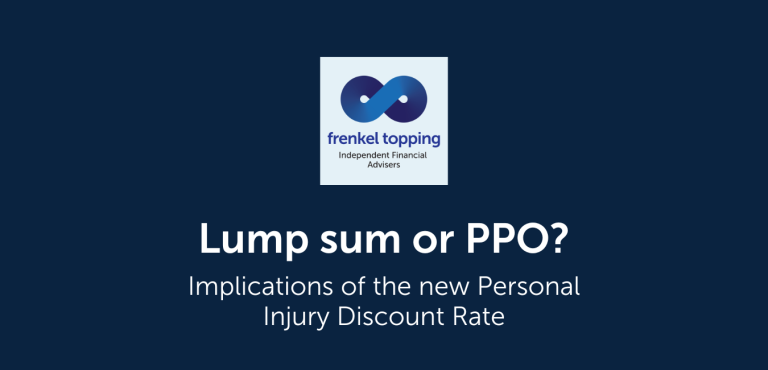What is a PPO?
Quite simply, a Periodical Payment Order (PPO) is a court order that requires the defendant to provide annual payments to the claimant for the remainder of their life, rather than disbursing the compensation as a single lump sum. Often, this arrangement includes an initial lump sum payment as well.
The very first PPO in British legal history (at the time called a Structured Settlement) was devised by Frenkel Topping in 1989, in the case of Kelly v Dawes.
Why should I consider a PPO?
A PPO can be a great comfort to a claimant. They know that they will have a regular income for the rest of their life, and do not need to worry about running out of the money that has been awarded as a lump sum.
A PPO can be varied over time and linked to inflation, ensuring that if a claimant’s needs change as a result of their injuries, or economic conditions change dramatically, they will not be adversely affected in the same way as they could be with a single, unalterable final payment.
When should I consider a PPO?
A PPO should always be considered in cases where substantial damages are awarded – awards above around £1m are frequently used as a benchmark.
A PPO should also be considered in cases where there is a disagreement over a claimant’s life expectancy. With lump sum awards, defendants often attempt to underestimate life expectancy, while claimants tend to overestimate it. PPO’s can eliminate this contention by providing ongoing payments for the duration of the claimant’s life.
A PPO can also be a useful tool for claimants who are risk averse, as they eliminate the need for the claimant to take on investment risk, providing financial security without requiring the management and investment of a large lump sum. A stable income can remove significant worries for individuals who have already been through a traumatic injury and ensuing court proceedings.
What are the advantages of a PPO?
*Regular payments rather than one lump sum make it easier for the injured party to budget and manage funds and care costs. There is a much smaller chance of the money running out due to the annual PPO payments being guaranteed every year, which usually cover important aspects such as care and case management.
*A lump sum award is based on the estimated life expectancy of the injured person, which can often be a point of contention between parties. Periodical payments will continue for the injured person’s lifetime even if the injured person lives longer than expected. Equally, if a person dies sooner than expected the defendant will not have over-compensated.
*Compensation received by periodical payments is tax-free. Although a lump sum would not be taxable either, any income received on the lump sum, such as through investment returns, would be.
*Periodical payments can be index linked which means they can move up and down with inflation. Since the decision in Thompstone v Tameside & Glossop Acute Services NHS Trust [2008], the court can use the Annual Survey of Hours and Earnings Index (ASHE) to link to the PPO if the injured person is receiving on-going care. ASHE is the index for carers wages, meaning the Claimant is always going to be able to cover these costs over time.
*Should the defendant fail to make a periodical payment where a court judgment is in place, the injured person is afforded protection under the Financial Services Compensation Scheme.
*Means-tested benefits are not affected by periodical payments. A lump sum payment could affect them now, or in the future.
Are there any disadvantages?
*If the injured person lives a shorter life than expected then the periodical payments will stop, and their estate will not benefit from a lump sum.
*A lump sum payment gives the Claimant more freedom to invest, should they so choose. They can do what they want with the whole award and choose to invest it on a their preferred level of risk strategy.
*As already noted, periodical payments can be index linked. This means they can also move down with inflation.
*Some injured parties prefer to receive a lump sum so they feel they achieve a clean break, cutting all ties with the Defendant. They can then focus on recovery without being dependant on regular payments, and yearly proof of lives.
What Expert Witness reports do Frenkel Topping provide?
- Loss of Pension
- Loss of Earnings
- Loss of Income
- Loss of Dependency
- Form of Award Report
- Settlement Assessment
What should I do next?
Contact Frenkel Topping to arrange a CPR Compliant Form of Award Report, which will assess the correct form of award for your client, taking into account cash flow analysis, advantages/disadvantages, plus preferences of the Claimant and their family.
Please contact enquires@frenkeltopping.co.uk



